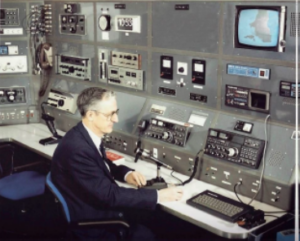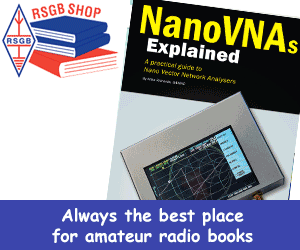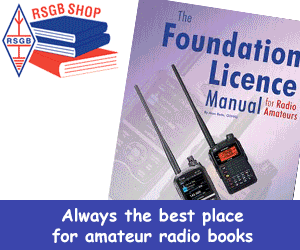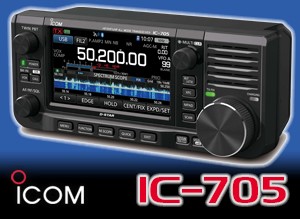Geoff Voller, G3JUL – 2022
 Geoff Voller – G3JUL
Geoff Voller – G3JUL
1929 – 2022
Geoff’s earliest memories were from when he was three years old. Unfortunately, they were not happy ones as he caught pneumonia and was sent to an isolation ward in Broadstairs, Kent, there being no cure at that time. Thankfully he survived although he would have recurring problems with his lungs and it was pneumonia which took his life.
Geoff grew up in Isleworth, located within The Borough of Hounslow, West London. When the Second World War started, he was a Scout and was recruited to run messages between air raid warden sites. This was incredibly dangerous for someone so young but fortunately Scouts were soon replaced by telephone lines. During one bombing raid a bomb landed in the road outside his house pushing earth up over the front door and downstairs windows, and flinging a huge curbstone up through the roof to land in his parents bed. Luckily the whole family were sheltering under a steel table in the living room. In 1948 Geoff became a Scout Leader with 1st Isleworth and that is where he met the lady who would become his wife, Shirley, who he called Poppy.
Geoff’s first job from 1947 was as an apprentice bricklayer and he qualified in 1950. Unfortunately, his health was not up to an outdoor job and this, combined with his wish to set up home with Shirley, made him decide to enlist with the RAF in 1951. If you signed up for three years and got married then you’d be entitled to married quarters. Little did he know that his hobby as a shortwave listener would mean that after his initial training, he would be sent to Habbaniah in Iraq for three years! Shirley hurriedly obtained a Special Licence from the Bishop of London and they were married before he left.
In Habbaniah, Geoff was part of the 276 RAF Signals Unit listening to military radio transmissions for MI6. He did not know at the time that they had a spy in their midst. The spy, Douglas Britten, was discovered in 1968 and Geoff was due to give evidence at his trial at the Old Bailey. The day before Geoff was due to appear in court as a witness, Britten confessed.
After returning to the UK and being discharged from the RAF, Geoff obtained his amateur radio licence and call sign G3JUL in 1954. He got a job as Museum Assistant in the Radio and Communications Department of the Science Museum in South Kensington, West London. There he devised, built and managed the amateur radio station GB2SM and became famous globally in the world of amateur radio.
In 1966 Geoff was in BBC Radio programs on four occasions. He was paid 25 guineas to talk about the island of Tristan da Cunha with which he had regular radio contact and was able to raise the alarm to send rescue aid when it was cut off after a hurricane.
Geoff was a member of the First Class Operators Club for many years and in 1985 he was awarded the Calcutta Key by the Radio Society of Great Britain for 30 years’ service to GB2SM. He retired from the Science Museum in 1990. The radio station was sadly wound down over the following years and no longer exists at the museum.
During his working years, Geoff remained a reservist, first in the RAF Reserve, then the Royal Signals Army Emergency Reserve and from 1967 to 1986 in 31 Signals Regiment of the Territorial Army based in Hammersmith. As well as training at weekends, he would go away on summer camp each year to either Scarborough, where he got his HGV license or to Belgium, where the unit was deployed to provide a radio communications hub for NATO.
Geoff was also a member of the Echelford Amateur Radio Society in Ashford, Surrey for many years and numerous society members attended his funeral.
After retiring, Geoff was carer to Shirley who suffered all her life from Rheumatoid Arthritis. Together, they set up the local branch of Arthritis Care, assisted Ashford Helping Hands and sat on various advisory committees for local Social Services, Ashford Hospital and Studholme Medical Centre.
Some of Geoff’s colleagues at the Science Museum and Army have pointed out that he was a meticulous planner and this trait continued to the end of his days. It used to somewhat infuriate me that every little job had to be thought about and talked through before it could be done, often taking far longer than the actual job itself! During the last year of his life, Geoff’s carers mostly thought this to be hilarious as it extended even to dressing and undressing. They were even more patient than I am for which I am so grateful. I remember being told by someone in the Army that Geoff’s nickname was Speedy!
Geoff was always keen to chat to anyone who cared to listen, and offer advice where he could. He loved a function and prided himself in being able to blag his way into any that he wasn’t invited to. As a result, he met and helped numerous people during his life.
David Voller
Geoff’s Son
Geoff Voller – Tribute
Kev Lamb – G4BUW
Geoff and I met at the Echelford Amateur Radio Society, St. Martins Court, Ashford in 1970, when I was a young short wave radio listener.
It was to be the start of a very long and much valued friendship, which together with Geoff’s dear wife, Shirley, became extended to my family.
At that time, the late John Barker, radio callsign G3SAZ, another Echelford member, was tutoring me on the technical elements of the Radio Amateur’s Examination. In parallel with that, Geoff was teaching me about communications techniques and operating procedures at society events and his home. Indeed, I am grateful that Geoff, Shirley and David put up with me knocking on their door Sunday mornings to observe Geoff do his stuff on the Echelford radio net and at other times for Morse contests.
Geoff would demonstrate techniques to contact unusual countries and callsigns using Morse, and especially his hunting tactic; he was amazingly successful at this right up to a few months before he passed away. I was always impressed that this man, even when in his 90’s, could use a Morse key to achieve such enviable results. He won many awards in reflection of his skill and dedication.
When I became licensed, Geoff was my first radio contact. He very kindly lent me various bits and pieces over the years to help broaden my radio and electronics horizons, and did the same for numerous other people.
Geoff remained active on the Echelford nets and particularly in his regular communications with Pat, M0AAC.
As David mentioned, the Science Museum radio station GB2SM and Geoff were very well known the world over. This was the only full-time exhibition station on the planet and was key to introducing thousands of museum visitors to radio communications. Geoff formed a team of voluntary operators, which I was very pleased to be part of and so too was my brother Geoff, GI0LAM.
Because GB2SM was a Government owned operation, it could work outside the constraints of conventional amateur radio stations. Geoff applied this when I was in the Merchant Navy as a Radio Officer and we had a great conversation (or “rhubarb” as Geoff would say) on HF when I was off the West African coast on a cargo ship.
One sunny afternoon, Geoff took me on to the roof of the museum to see the large, multi-element rotatable beam antenna that got GB2SM’s high power signals out so well all over the world. Whilst I was gazing in amazement at that and the spectacular view over South Kensington, Geoff pointed to another amateur radio aerial on the roof of a building next to the museum, and wryly said: “That’s the Imperial College guys. I try not to point the beam in their direction when I’m on the air and they are, or I might blow their socks off!”
Last, but certainly not least, Geoff was a highly knowledgeable radio communications historian. His work as a Senior Curator at the Science Museum, fueled by an inquisitive nature and strong passion, led to him becoming an expert across a wide spectrum. This included clandestine communications and intelligence gathering during World War 2 that was such an important foundation for Britain and its allies staying free countries.
Kev Lamb – G4BUW
Category: Silent Keys










